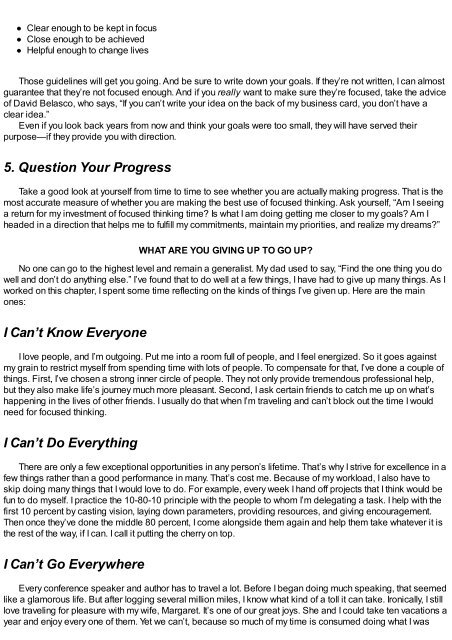howsuccessfulpeoplethink-changeyourthinkingchangeyourlife-150414064712-conversion-gate01-ID-3023c225-7df9-4268-9ab4-d2b9cb3d4c62
Create successful ePaper yourself
Turn your PDF publications into a flip-book with our unique Google optimized e-Paper software.
Clear enough to be kept in focus<br />
Close enough to be achieved<br />
Helpful enough to change lives<br />
Those guidelines will get you going. And be sure to write down your goals. If they’re not written, I can almost<br />
guarantee that they’re not focused enough. And if you really want to make sure they’re focused, take the advice<br />
of David Belasco, who says, “If you can’t write your idea on the back of my business card, you don’t have a<br />
clear idea.”<br />
Even if you look back years from now and think your goals were too small, they will have served their<br />
purpose—if they provide you with direction.<br />
5. Question Your Progress<br />
Take a good look at yourself from time to time to see whether you are actually making progress. That is the<br />
most accurate measure of whether you are making the best use of focused thinking. Ask yourself, “Am I seeing<br />
a return for my investment of focused thinking time? Is what I am doing getting me closer to my goals? Am I<br />
headed in a direction that helps me to fulfill my commitments, maintain my priorities, and realize my dreams?”<br />
WHAT ARE YOU GIVING UP TO GO UP?<br />
No one can go to the highest level and remain a generalist. My dad used to say, “Find the one thing you do<br />
well and don’t do anything else.” I’ve found that to do well at a few things, I have had to give up many things. As I<br />
worked on this chapter, I spent some time reflecting on the kinds of things I’ve given up. Here are the main<br />
ones:<br />
I Can’t Know Everyone<br />
I love people, and I’m outgoing. Put me into a room full of people, and I feel energized. So it goes against<br />
my grain to restrict myself from spending time with lots of people. To compensate for that, I’ve done a couple of<br />
things. First, I’ve chosen a strong inner circle of people. They not only provide tremendous professional help,<br />
but they also make life’s journey much more pleasant. Second, I ask certain friends to catch me up on what’s<br />
happening in the lives of other friends. I usually do that when I’m traveling and can’t block out the time I would<br />
need for focused thinking.<br />
I Can’t Do Everything<br />
There are only a few exceptional opportunities in any person’s lifetime. That’s why I strive for excellence in a<br />
few things rather than a good performance in many. That’s cost me. Because of my workload, I also have to<br />
skip doing many things that I would love to do. For example, every week I hand off projects that I think would be<br />
fun to do myself. I practice the 10-80-10 principle with the people to whom I’m delegating a task. I help with the<br />
first 10 percent by casting vision, laying down parameters, providing resources, and giving encouragement.<br />
Then once they’ve done the middle 80 percent, I come alongside them again and help them take whatever it is<br />
the rest of the way, if I can. I call it putting the cherry on top.<br />
I Can’t Go Everywhere<br />
Every conference speaker and author has to travel a lot. Before I began doing much speaking, that seemed<br />
like a glamorous life. But after logging several million miles, I know what kind of a toll it can take. Ironically, I still<br />
love traveling for pleasure with my wife, Margaret. It’s one of our great joys. She and I could take ten vacations a<br />
year and enjoy every one of them. Yet we can’t, because so much of my time is consumed doing what I was

















